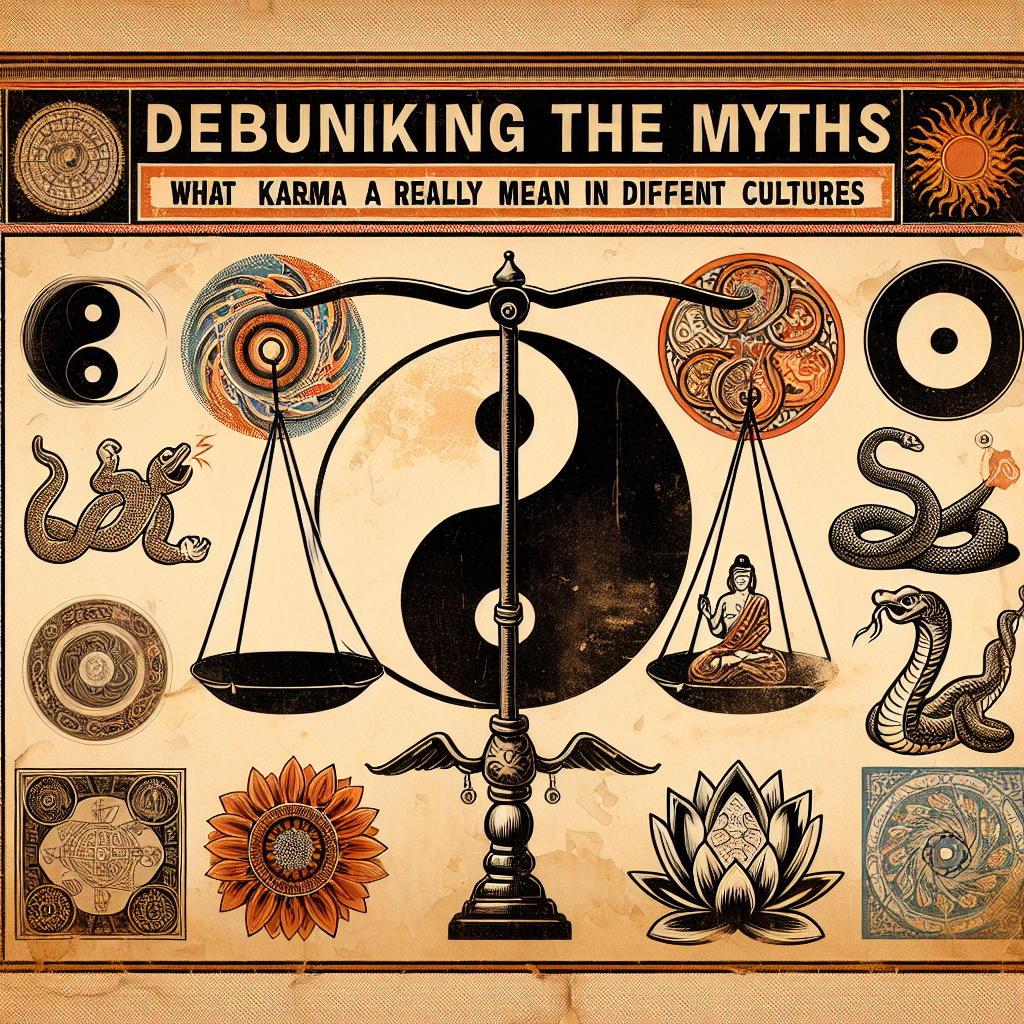The concept of karma has permeated public consciousness, often misinterpreted or oversimplified in popular culture. Many people equate karma solely with a simplistic cause-and-effect ideology — do good, and good will come back to you; do bad, and bad will return. While this understanding captures an element of karma, it fails to appreciate its complex and diverse meanings across various cultural and philosophical contexts. In this article, we will delve into the true essence of karma and explore its interpretations in multiple cultures, shedding light on misconceptions while emphasizing the rich tapestry of beliefs surrounding this concept.
What is Karma?
The term "karma" is derived from the Sanskrit word "karman," meaning "act" or "action." Within the philosophies of Hinduism and Buddhism, karma refers to the moral actions of an individual and the subsequent consequences that arise from those actions. It encompasses not only actions but also thoughts and intentions. Karma suggests that our actions — whether positive or negative — shape our present and future experiences, not merely in a single lifetime but potentially across multiple lifetimes.
Misunderstandings of Karma
Simplistic Punishment and Reward System: Many people believe karma functions strictly as a cosmic scoreboard: good deeds are rewarded, and bad deeds are punished, leading to a binary view of moral behavior. However, karma is more nuanced and is less about rewards and punishments and more about understanding the choices we make.
Immediate Consequences: The misconception that karma manifests immediately can lead to disillusionment when negative actions do not yield swift retribution. Karma operates on a time scale that can transcend lifetimes, making its workings more subtle and less immediate than many might imagine.
- Fatalism: Some interpret karma as a deterministic force that removes personal agency, believing they are bound by their past actions. In reality, while karma recognizes past actions, it also emphasizes the power of the present to influence future outcomes through conscious decision-making.
Different Cultural Interpretations of Karma
1. Hinduism
In Hindu philosophy, karma is intricately woven into the doctrine of samsara, the cycle of birth, life, death, and rebirth. Hindus believe that one’s current life circumstances are influenced by their actions in previous lives, and one’s current actions will determine their future reincarnations. The law of karma is not only about deeds but also about intentions; righteous intent is believed to generate positive karma, while malicious intent leads to negative karma.
The ultimate goal in Hinduism is to achieve moksha, or liberation from samsara, and practicing good karma is essential to this spiritual journey.
2. Buddhism
Buddhism adopts the concept of karma but emphasizes the importance of intention (cetana) as a driving force behind karma. The Buddha taught that moral actions can lead to positive karmic results, fostering enlightenment and freedom from the cycle of samsara. This interpretation suggests that karma is inextricably tied to ethical conduct and mindfulness.
In Buddhism, karma plays a crucial role in understanding suffering, as our desires and attachments can lead to negative karma. Through practices like meditation and compassion, individuals can cultivate positive karma, ultimately leading toward enlightenment (nirvana).
3. Jainism
Similar to Hinduism and Buddhism, Jainism also embraces the concept of karma, viewing it as a form of matter that adheres to the soul as a result of one’s actions. Jains believe that every action, thought, and word contributes to the accumulation of karma, which can be positive or negative. The ultimate aim is to achieve liberation (moksha) by purging the soul of all karmic matter.
Jains uphold the principle of ahimsa (non-violence) to limit harm to any living being, aiming to create an environment for positive karma and spiritual growth.
4. Sikhism
In Sikhism, karma is acknowledged as a vital component of understanding one’s relationship with the divine. Sikhs believe in the importance of living a truthful and honest life while recognizing that actions bear consequences. However, unlike some traditions that emphasize a strict karmic balancing act, Sikh teachings encourage individuals to seek God’s grace, whereby divine will can transcend the consequences of karma.
5. Western Interpretations
In Western contexts, karma often enters conversations about morality, justice, and retribution, yet it is frequently diluted or interpreted through the lens of individualistic culture. Expressions like “what goes around comes around” capture some essence of karma, yet typically neglect to address the intricacies of intention, multiplicity of lifetimes, and the cultural underpinnings that inform various interpretations of karma globally.
The Modern Misapplication of Karma
In the age of social media and celebrity culture, the word "karma" is often used casually, typically in the context of someone experiencing misfortune that serves as poetic justice. This reductionist view can detract from the deeper, philosophical implications of karma. It can also lead to a sense of moralistic judgment that enforces a community’s perspective rather than fostering understanding and compassion.
Conclusion
Karma is a rich and multifaceted concept that transcends simplistic notions of reward and punishment. By examining its different interpretations across cultures, we begin to appreciate how karma informs ethical decision-making, personal accountability, and spiritual growth. Whether viewed through the lens of Hinduism, Buddhism, Jainism, Sikhism, or more secular interpretations, the core idea revolves around the connection between actions, intentions, and their repercussions.
As we navigate our lives, embracing a deeper understanding of karma allows us to cultivate compassion for ourselves and others, recognizing that we are all products of our past actions but also creators of our future realities.
FAQs about Karma
1. Is karma always about punishment and reward?
- Not necessarily. Karma encompasses the understanding that actions have consequences, but it is not a simplistic punishment/reward system. Intentions and ethical conduct matter significantly.
2. Does karma affect multiple lifetimes?
- Yes, in many Eastern philosophies such as Hinduism and Buddhism, karma is tied to the cycle of rebirth, affecting lives both past and present.
3. Can one change their karma?
- Absolutely. One’s current actions and intentions can influence future outcomes, allowing for the possibility of positive change.
4. How does karma relate to the concept of free will?
- Karma acknowledges past actions but emphasizes the capacity to make conscious choices in the present that can shape future experiences.
5. Is the concept of karma universal?
- While the term "karma" and its specific interpretations vary, the underlying notions of moral responsibility and the interconnectedness of actions are present in many cultures globally.
It looks like you might want to create a prompt or are looking for an idea to explore. Could you provide more details on what you’re looking for? Whether it’s writing prompts, discussion topics, creative ideas, or something else, I’d be happy to help!, #Debunking #Myths #Karma #Means #Cultures, #Debunking #Myths #Karma #Means #Cultures, 1736479090, debunking-the-myths-what-karma-really-means-in-different-cultures





